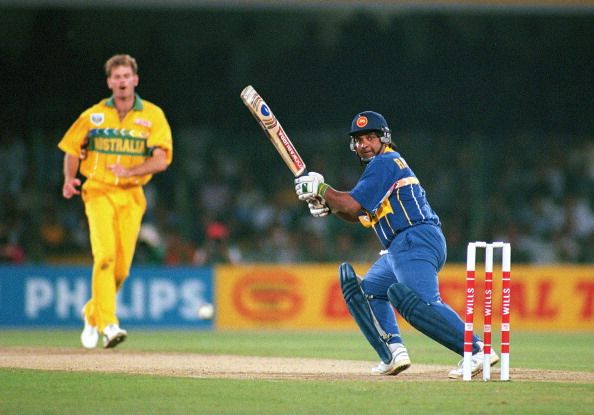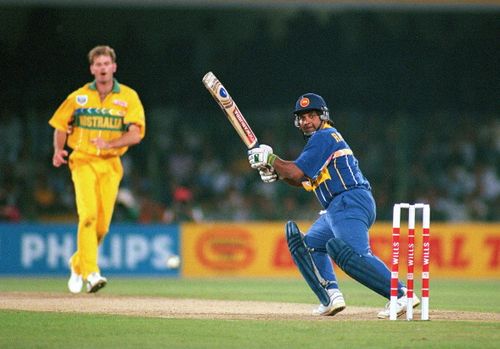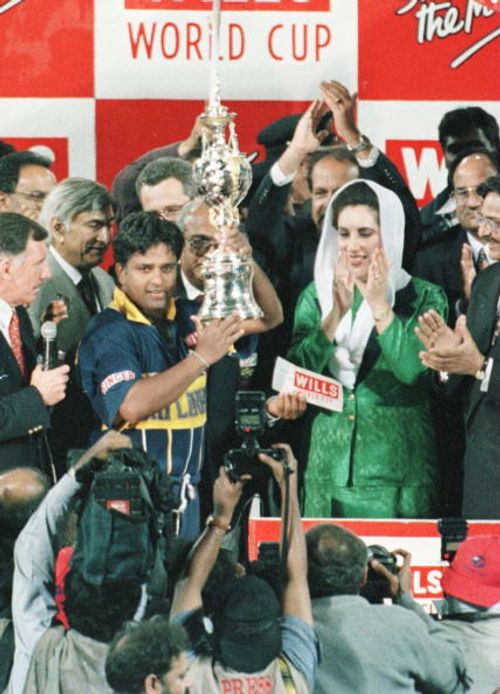
Cricket’s Commanders-in-chief: Arjuna Ranatunga

It is better to lead from behind and to put others in front, especially when you celebrate victory when nice things occur. You take the front line when there is danger. Then people will appreciate your leadership
– Nelson Mandela
Think 1996 World Cup and Arjuna Ranatunga’s name springs up, almost like a reflex. For as much credit as the entire Sri Lankan cricket team deserves for that one victory, it was the individual contribution of this one man that inspired his teammates to believe in themselves to go the distance.
For someone who spent almost two decades on the international cricketing pitch, it’s not really surprising that Ranatunga’s popularity stems majorly because of his heroics at the 1996 World Cup. In the eight years between his ascendancy as the captain of the Sri Lankan cricket team and the 1996 World Cup, the changes he wrought were testimony to the fact that he meant serious business about his role and responsibility, no matter the consequences to his personal reputation.
It’s not so often that a captain takes such an univocal stand about putting himself out for the team, at all times. For as selfless and motivating captains can be, at times self-preservation and self-interest can become a conflicting issue between their professional individuality and the rest of the team. And though Ranatunga has been criticised for various reasons, right from his physical fitness to his often outspoken disregard for cricketing authorities, there’s not a single person from anywhere across the globe who can point fingers about Ranatunga’s commitment to take his country’s cricketing legacy forward – together as a team and as one whole unit.
Many Sri Lankan cricketers who have found their way into the record books owe this man a lot of credit for making their initial introduction to the international cricketing arena simpler. Ranatunga’s uniqueness as a captain is further supported by his ability to look into the interior regions of the country seeking talent, rather than restrict it to the country’s capital. Giving more importance to
talent and employing a strong determination to nurture it, no matter the geographic locale from where his potential team-mates came, Ranatunga’s captaincy was one that spoke more about values and integrity than cricketing politics and its unnecessary offshoots. It’s amidst these qualities of upholding of integrity and nurturing of inherent gifts that yet another brilliant facet of Ranatunga’s captaincy emerges.
Hierarchical formalities and titular salutations that could stand to cause friction between team members were dispensed with, and an easy air of informality was cultivated. The practicality of such a move reflected a simple tactical demonstration of a man who went on to be well-known as the most valued tactician in the Sri Lankan squad during his heydays as the captain. And though, presently, Ranatunga has borne the brunt of many cricketing experts for his blatant forthrightness against establishment, his opinions and tactical comments about teams and their players is never slighted.

Most Indian cricketing fans think of the 1996 World Cup as the ultimate dent in their display of sportsmanship considering the debacle that occurred at the Eden Gardens. But where many Indians did indeed feel let down, one cannot forget the sense of thorough perfection with which the Sri Lankans deconstructed and annihilated each of their opponents, be it the Indian squad in the semi-finals or even the might of the Australians in the finals.
And though by the end of the 20th century, and most importantly, by the time the next World Cup had arrived, Ranatunga’s captaincy had started to be looked upon with skepticism rather than with favoured trust, Ranatunga had achieved what he wanted to. The Sri Lankan cricket team’s fame had reached far and wide, so much that in the later years, they were often the ones counted as the front-runners to win the World Cup.
From a young collegian making his debut at the age of 18 against England in the early 80s, to a man who went on to challenge an umpire, putting his faith behind a spinner whose entire career was hanging in the balance, Ranatunga’s excellence is evidentn not by reading his name in leading cricketing journals but in the way his former team-mates, the present-generation youngsters and his peers from cricketing nations all over talk about him. He may have been plump, and his skill to run between the wickets may have been poor, but when it mattered and where it mattered, Ranatunga more than proved his worth – merely by being a force to be reckoned with, and literally at that.